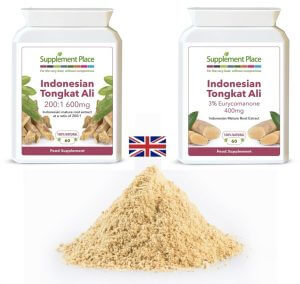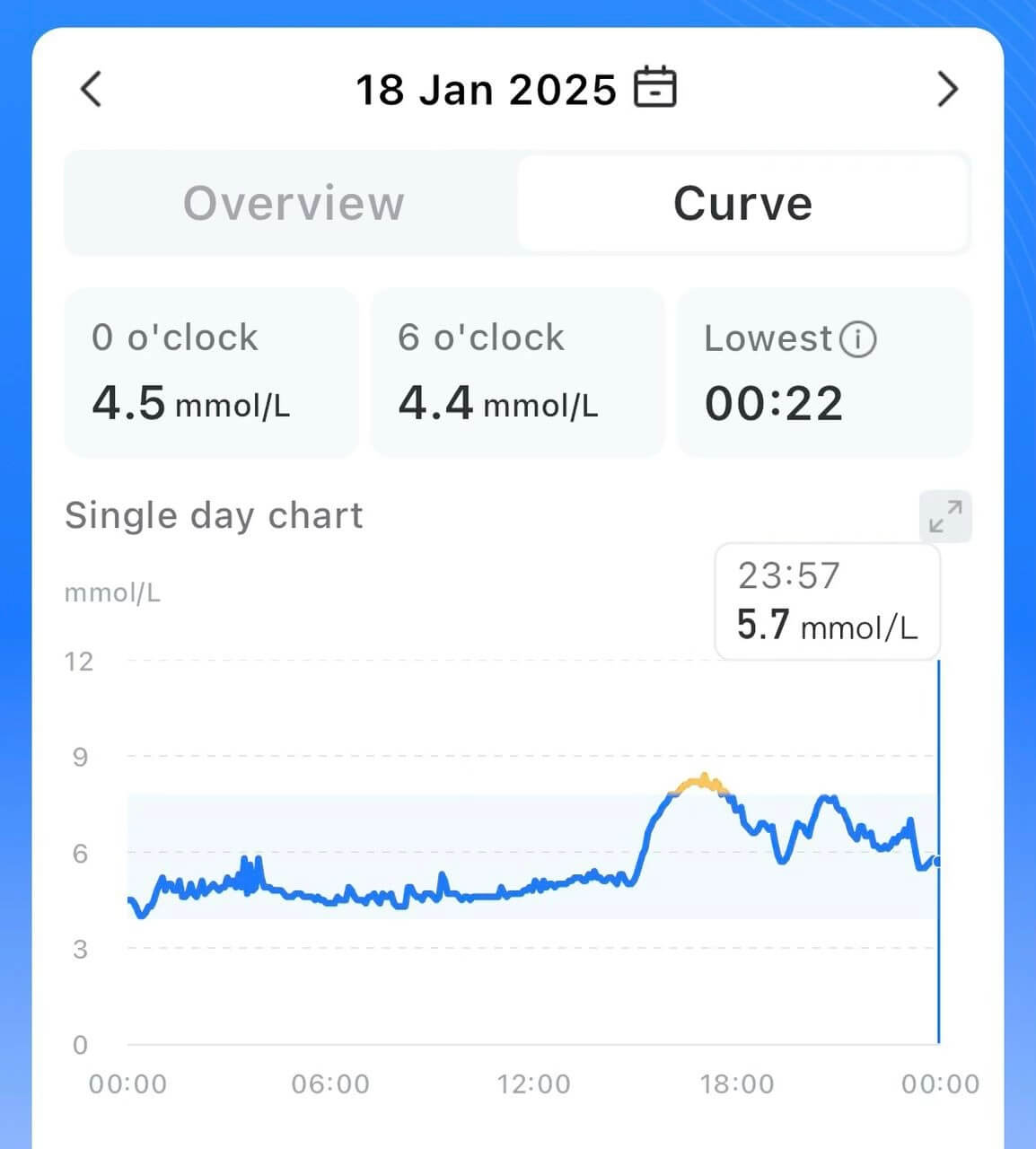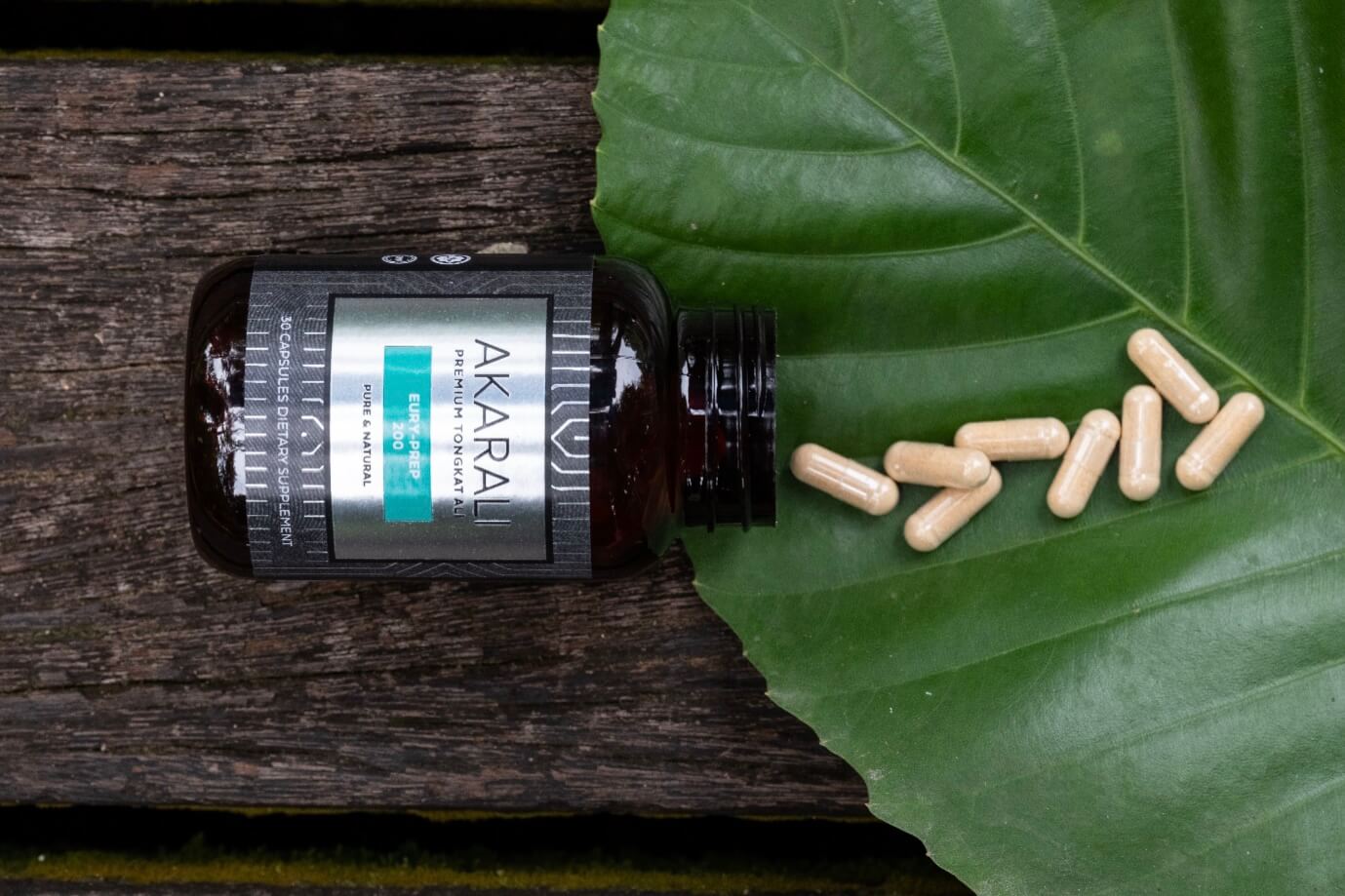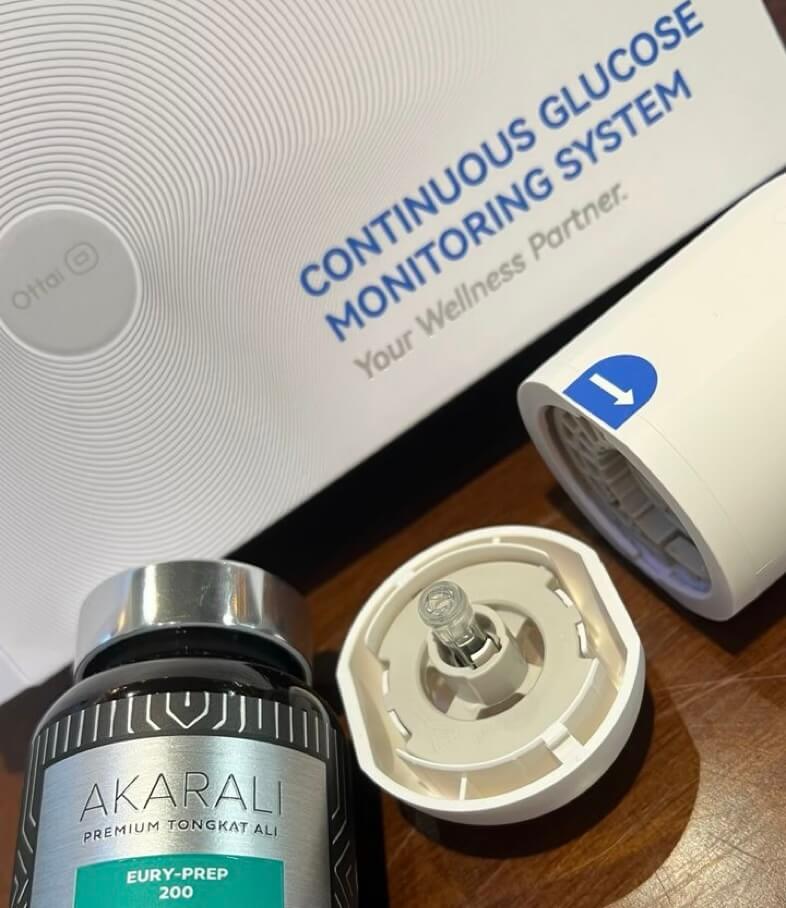

Natural diabetic supplements that lower your blood sugar levels may benefit pre-diabetic and diabetic patients, but is Tongkat Ali an effective remedy to regulate your blood glucose if you are diabetic?
This article provides deep-dive insights, reviews and studies on Tongkat Ali as a herbal supplement for diabetes or to support diabetic health. If you are an existing diabetic patient who is considering taking Tongkat Ali supplements to lower your blood sugar, then this article may help you decide if this herb is the best supplement to reduce or manage your blood sugar levels.
Tongkat Ali (Eurycoma Longifolia) is a herbal root plant found in Southeast Asia and recently investigated as a potential diabetic supplement due to its antihyperglycemic properties that help lower and regulate blood sugar levels in humans.
But before you consume Tongkat Ali, it is good to understand if you have Type 1 or Type 2 diabetes. According to health experts, Tongkat Ali may be safe if you are diagnosed with type 2 diabetes but it may not be safe or effective on other types of chronic diabetic diseases such as diabetic retinopathy or cardiomyopathy.
Early findings showed that Tongkat Ali may be effective and safe for mild type 2 diabetic patients or those with prediabetic symptoms. However, it has no effects on blood sugar if you are non-diabetic.
Diabetes mellitus, which encompasses both Type 1 and Type 2 diabetes, is a chronic health condition characterized by elevated blood glucose levels, either when the pancreas does not produce enough or the hormone insulin or when the body cannot effectively use the insulin (i.e insulin resistant). Whilst you still can take Tongkat Ali in small doses, it will not increase your blood glucose levels if taken regularly unless you are on a strict diabetic medications.
Patients diagnosed with Type 1 or Type 2 diabetes can lead to severe, debilitating, and deadly complications like diabetic retinopathy, Hyperosmolar Hyperglycaemic State (HHS), diabetic cardiomyopathy, and diabetic ketoacidosis (DKA) if not managed properly.
While conventional treatments like insulin therapy and oral antihyperglycemic agents are commonly used, there is growing interest in natural supplements such as Yellow Tongkat Ali (Eurycoma longifolia) for managing diabetic health, due to the optimization of hormonal benefits found in modern, clinically tested extracts.
Therefore, long term diet change or supplementation of herbs such Tongkat Ali may offer a sustainable solution when incorporated as a part of a health optimization protocol that benefit the endocrine hormonal system. Efficient production of hormonal insulin may improve insulin resistance and performance, thus reducing risks associated with hormonal deficiency diabetic cases.
Type 1 Diabetes: Type 1 diabetes is an autoimmune condition where the body’s immune system mistakenly attacks and destroys insulin-producing beta cells in the pancreas. This leads to an absolute deficiency of insulin, necessitating lifelong insulin therapy for glucose regulation.
Type 2 Diabetes: Type 2 diabetes, more prevalent than Type 1 and accounting for 90–95% of diabetes in developed countries, arises from insulin resistance and often correlates with obesity, blood lipid levels, poor diet, and sedentary lifestyles. Over time, the pancreas may fail to produce adequate insulin, complicating blood sugar control. Lifestyle modifications, including diet and exercise, alongside antihyperglycemic medications, and even dietary supplements, are essential in managing Type 2 diabetes.
If you are diagnosed with Type 1 or Type 2 Diabetes, taking Tongkat Ali may lower your blood sugar levels by improving your islet performance, reducing blood cholesterol level and glycogen deposits and improving overall insulin resistance.
This is supported by recent studies that show Tongkat Ali can significantly reduce blood glucose levels in hyperglycaemic conditions, improve insulin sensitivity, and support pancreatic beta-cell function.
Tongkat Ali reduces blood cholesterol levels and blood glucose by improving insulin sensitivity which may support diabetic health. This may offer added benefit to diabetic patients.
In a dose-dependent peer-reviewed study published in the Journal of Nutrients, Tongkat Ali (Eurycoma Longifolia) root extract did not show hypoglycemic effects at 25, 50 and 100mg/kg of bodyweight after eight weeks. Test results showed a significant reduction of the blood cholesterol level and the glycogen deposit in hepatocytes, with elevated insulin levels. The study suggests that Tongkat Ali has antihyperglycemic properties and helps islet performance by increasing beta-cells and pancreatic expression.
While Tongkat Ali (Eurycoma Longifolia) may offer other hormonal and immunity benefits, it should be used under guidance from a health professional when taken with diabetic medications.
According certified doctor Dr. Zamir Hillman (MD), diabetic patients should ideally stop any diabetic medications such as Metformin (Fortamet), Sulfonylureas, glimepiride when taking Tongkat Ali supplements.
He said “Whilst there have been no reported adverse side effects when combining diabetic medication with Tongkat Ali supplementation, there are still risks and the best solution is not to take them together, especially at high doses”
While Tongkat Ali may be taken as a daily supplement by those with high sugar levels or those exhibiting pre-diabetic symptoms, it is still crucial for diabetic patients to consult with their healthcare providers before incorporating Tongkat Ali into their regimen, as individual responses may vary and potential interactions with existing medications may occur.
Based on limited human studies, standardized Tongkat Ali hot water root extract may aid diabetes by improving insulin sensitivity and beta-cell performance, whilst reducing glucose absorption from the intestines. While its antihyperglycemic properties help to reduce blood sugar levels between 38% to 47% based on 150mg/kg of body weight, users are advised not to take Tongkat Ali in high doses (i.e above 200mg daily) to avoid hypoglycemia (low blood sugar), which is indicated by dizziness, nausea and other symptoms.
Not all Tongkat Ali extracts are effective in lowering blood glucose levels, but standardized hot water Tongkat Ali extract offers higher efficacy.
Given the nature of the highly unregulated supplement industry, not all Tongkat Ali supplements are effective or beneficial for diabetic patients.
And here is why.
According to functional health coaches, most Tongkat Ali supplements contain excessive maltodextrin (i.e fillers or binders) may cause a rapid increase in blood sugar (or known as “sugar spikes”), which is not suitable for type 2 diabetes. Maltodextrin has a higher glycemic index than table sugar and can increase blood sugar levels. Although it is relatively safe to consume in small amounts, you may want to choose high-quality natural or organic Tongkat Ali brands that are free from fillers (maltodextrin), adulterants, impurities or additives.
Unadulterated standardized Tongkat Ali hot water extract are often preferred and viewed as a better choice for diabetes if you opt for a natural plant-based approach to manage your blood sugar levels over a longer term. This is taken orally as a supplement or as a topical cream, often in small doses with a keto-diet or sugar-free diet.
The effects of Tongkat Ali in reducing blood glucose levels are often gradual if taken in low doses, from days to weeks. Often you may need to watch your diet and avoid ultra- processed food, breads, fruits and desserts when taking Tongkat Ali for optimal results.
Please check with your healthcare professional before consuming Tongkat Ali if you have type 1 or 2 diabetes.
For diabetic and prediabetic person
There are several animal studies conducted in 2018 and 2020 showing the effects of Tongkat Ali in lowering blood glucose levels between 8% to 41% in diabetic animals. These studies suggest the potential use of Tongkat Ali as an antidiabetic supplement – notably if you are diagnosed with hyperglycaemia (high blood sugar levels). Do expect an incremental improvement in your blood sugar levels after the 2nd week or 8th week when taken at doses between 100mg to 200mg daily.
In an animal study published in 2020, Tongkat Ali showed a reduction of the blood glucose level after the 8th week based on a daily dose of 25mg, 50mg and 100mg/kg of body weight.
A higher dose of Tongkat Ali root extract at 100mg/kg of body weight showed the highest reduction of blood glucose level at 41% (from 228 mg/dL to 134 ng/dL) after the 8th week. At the same time, the same study showed no reduction of body weight after the 8th week, indicating Tongkat Ali has no significant effect in reducing body weight in diabetic mice.

For non-diabetic person
If you have no blood sugar spikes after your meals or consider yourself as non-diabetic, then taking Tongkat Ali in regular doses of 200mg or even at high doses of 800mg may not cause any drastic reduction in your blood sugar levels below safety levels.
Our pilot study conducted in January 2025 revealed that Tongkat Ali did not have any significant effect on the blood glucose levels of a non-diabetic person who took 200mg, 400mg, 600mg and 800mg of standardized Tongkat Ali root extract before his meal.
Further investigation revealed that his blood sugar levels were in the optimal (safe range) 94% of the time after taking Tongkat Ali and did not record any significant reduction in blood sugar levels below the safety range.
Standardized hot water Tongkat Ali root extract offers optimal blood sugar regulation support for non-diabetic person for continuous energy boost without the risk of lowering your blood glucose levels below the safety range.

Our six-day observation concludes that Tongkat Ali is relatively safe for endurance sports and athletic performance as it does not lower blood sugar (glucose) if you are not diabetic or if you are not diagnosed with any chronic diabetic diseases.
Despite limited clinical studies on diabetic patients, experts suggest that Tongkat Ali may still be used as an antidiabetic natural supplement to reduce blood glucose levels when taken at moderate doses. This helps to regulate your blood sugar levels or balance your insulin resistance if you have sugar cravings, or when you have been consuming high amounts of sugar in your daily diet.
For beginners, you should consider taking Tongkat Ali in small doses as a start (200mg) and monitor your blood glucose twice a day (ideally an hour after meal) before gradually increasing the dose on 2nd, or 4th week.
Researchers found that Tongkat Ali (Longjack) extract has the same effects in lowering blood glucose sugar levels compared to anti-diabetic medication drugs in a 2021 study.
Given promising findings by researchers in recent years, functional health coaches recommend intermittent fasting and keto-diet to get better results if you are taking Tongkat Ali. As an alternative to glyburide, this health protocol may lower your blood glucose level and improve your insulin sensitivity after a period of 4 to 12 weeks.
For diabetic patients, expect a significant reduction in your blood sugar levels between four to six weeks if you are taking 100mg to 200mg standardized Tongkat Ali hot water extract daily. However, if your blood sugar drops below 90 milligrams per deciliter (90 mg/dL), you should stop taking Tongkat Ali completely for at least 72 hours to ensure you minimize any risks associated with hypoglycemia (low blood sugar).

There are growing studies on the potential benefits of Tongkat Ali on diabetic health, most of which are related to hormonal production, improving insulin sensitivity, blood sugar regulation, regulating cholesterol levels, oxidative stress and anti-inflammatory effects.
Let’s look at some of the benefits that are related to diabetic-related health.
Blood Sugar Regulation:
Tongkat Ali has demonstrated significant antihyperglycemic properties, particularly in hyperglycaemic conditions. It enhances insulin sensitivity, supports beta-cell performance, and reduces glucose absorption from the intestines, aiding in the control of blood sugar levels.
Anti-Inflammatory Effects:
Chronic inflammation is a hallmark of diabetes mellitus, contributing to insulin resistance and beta-cell dysfunction. Tongkat Ali’s potent anti-inflammatory properties can help mitigate these issues, promoting better glycaemic control and reducing the risk of diabetic complications.
Improvement in Lipid Profile:
In addition to lowering blood sugar levels, Tongkat Ali has been shown to have beneficial effects on lipid profiles. It can reduce circulating cholesterol levels, addressing the common comorbidity of dyslipidemia in diabetic patients.
Mood, Stress, and Cravings:
Clinical studies show that Tongkat Ali supplementation is effective for reducing stress and improving mood. It works by reducing cortisol, boosting testosterone, and enhancing dopamine levels. These hormonal-responses help diabetic patients manage their cravings for unhealthy foods, including sweets. This can be particularly beneficial for those struggling with emotional or stress eating, a common challenge in managing diabetes. Improved mood and reduced stress can lead to better dietary choices and adherence to a healthier lifestyle.
Healthy Weight Loss:
Tongkat Ali enhances metabolism, aiding in healthy weight loss by promoting efficient energy conversion from food intake. It stimulates thermogenesis, a process of heat production that burns calories, thereby promoting more efficient weight loss, improving body composition, and reducing Body Mass Index (BMI). Increasing metabolic rate and burning calories more efficiently play a crucial role in managing Type 2 diabetes by synergistically further improving insulin sensitivity and promoting better blood sugar control.
By enhancing metabolism, the body becomes more efficient at utilizing insulin, which helps regulate glucose levels more effectively. Meanwhile, efficient calorie burning supports weight management, reducing excess fat stores that contribute to insulin resistance.

Tongkat Ali may exhibit similar properties in lowering blood sugar (glucose) levels for type 2 diabetes as compared to antidiabetic medication drugs when taken with the correct doses for at least two to four weeks together with diet and weekly exercises.
In an animal study published in 2021 by Indonesian scientists, we found evidence that Tongkat Ali (Longjack) leaf extract has similar effect as anti-diabetic medication Glibenclamide (also known as glyburide), which reduces blood sugar in diabetic mice. Test results using Tongkat Ali extract of 176mg per 200g of body weight showed a reduction of blood glucose from 281.04 mg/dL to 156.77 mg/dL after 18 days. Comparatively, the diabetic mice showed a reduction of blood glucose levels from 279.2 mg/dL to 148.64 mg/dL during the same period after taking Glibenclamide. But it does not mean Tongkat Ali is superior, nor effective than glyburide or any other anti-diabetic medications
This study suggests Tongkat Ali may be as effective as antidiabetic drugs as it performs with similar potency and efficacy when taken daily for a minimum period of two weeks. However, taking glyburide and Tongkat Ali together may pose risks of developing hypoglycemia for diabetic patients, a condition when your blood sugar level drops below than 70 milligrams per deciliter (70 mg/dL).
One of the notable benefits of Tongkat Ali is its potential to boost testosterone levels. However, diabetic patients may struggle to see substantial improvements in testosterone levels unless they adopt a sugar-free or low-sugar diet. Research indicates that high sugar intake can lower testosterone levels and increase cellular inflammation, which can negate the benefits of Tongkat Ali.
Low-Sugar Diet and Testosterone:
A study conducted in 2018 revealed that sugar-sweetened beverages significantly reduce serum testosterone levels in adult males. By reducing processed sugars intake and adopting a low-sugar diet, diabetic patients can enhance the effectiveness of Tongkat Ali in boosting testosterone. This combination not only aids in better blood sugar control but also improves stamina, energy, lean muscle mass, and libido.
Learn more about the most effective ways to use Tongkat Ali here
Synergistic Benefits of Healthy Testosterone Levels for Type 2 Diabetes
Low testosterone levels are associated with increased risk of prediabetes and type 2 diabetes, and maintaining naturally healthy testosterone levels can benefit those with Type 2 diabetes. Testosterone plays a crucial role in insulin sensitivity, muscle mass development, and fat distribution—all factors crucial in the management of diabetes. Good testosterone levels help improve insulin sensitivity, which allows cells to better respond to insulin and regulate blood sugar levels more effectively. Moreover, testosterone promotes lean muscle mass, which enhances metabolic rate and aids in burning calories efficiently.
As Tongkat Ali can potentially affect blood sugar levels, diabetic patients that want to use this herb should start with a lower dose of 200mg or less daily. For best practice, they should consult with their healthcare provider and regularly monitor blood sugar levels to assess the impact of supplementation.
For safety, Tongkat Ali should only be taken by adults above the age of 18. Pregnant or breastfeeding women should avoid taking Tongkat Ali.
Learn more about optimal dosing and maximum limits for Tongkat Ali supplementation here
While standardized hot-water Tongkat Ali root extracts are generally considered safe for long-term human consumption as a diabetic supplement for hormonal deficiency diabetes, it is essential to be aware of potential side effects, particularly when taken in very high doses or generic Tongkat Ali extracts contain impurities or adulterants such as magnesium.
Using 3rd-party lab tested Tongkat Ali supplements from reputable organizations such as EUROFINS may reduce the risks of side effects or negative interaction for diabetic patients as it is tested for impurities, toxicity and adulterants.
Some reported side effects for diabetic patients when taking Tongkat Ali include:
Tongkat Ali may interact with certain diabetic medications such as metformin and sulfonylureas when taken in high doses as there are risks of hypoglycemia according to health experts. However, the negative interaction and risk profile have not been established based on existing studies.
Sulfonylureas (glyburide)
Tongkat Ali containing magnesium stearate found in Momentous Tongkat Ali may cause laxative effects when consumed in high doses (2,500mg/kg bodyweight) and the effect of magnesium may increase absorption of diabetic medication (sulfonylureas) and could potentially cause hypoglycemia.
Metformin
Experts suggest that Tongkat Ali may interfere with metformin (i.e Fortamet and Glucophage) when taken together in high doses. According to research experts, Tongkat ali increases effects of metformin by pharmacodynamic synergism. It is advisable for diabetic patients to stop current diabetic medication temporarily when using natural diabetic supplements such as Tongkat Ali whilst observing blood sugar glucose levels or any adverse side effects.
Related Article: Learn more about the potential side effects of Tongkat Ali and how to avoid it.
Tongkat Ali offers promising benefits for managing diabetes mellitus, particularly Type 2 diabetes, primarily by lowering blood sugar levels, enhancing insulin sensitivity, and improving lipid profiles. Its full potential as a diabetic supplement is best suited to address hormonal deficiency-related diabetic symptoms and when combined with a sugar-free or low-sugar diet, Tongkat Ali may offer a long-term natural remedy to manage diabetic health.
AKARALI is widely used as an antidiabetic natural supplement for diabetic patients to manage blood sugar levels. It contains pure standardized Tongkat Ali hot water extract that are handpicked from mature roots and 3rd party lab-tested from impurities, adulterants and additives.
To be cautious, diabetic patients considering Tongkat Ali supplementation should consult with their healthcare providers to ensure it fits well within their overall health protocol and to monitor for any potential side effects or interactions with existing medications.

Alex Kua leads AKARALI’s Global Partnership Community to help athletes, sports communities, and thousand of others optimize their well-being through evidence-based research that enables them to make better informed decisions. His legal and business consulting background underpins the rigorous data-driven approach in his writing – from hours of interviews, real-world performance data, and firsthand experiences of real people – offering actionable insights that connects clinical research, emerging health trends, and real-world applications. He is also an experienced researcher in herbal nutrition, with years of deep technical knowledge on Tongkat Ali (Eurycoma longifolia), including quality standards, industry benchmarks, lab tests, clinical trials, and the use of natural herbs by collaborating with top scientists, herbal experts, and nutritionists. As part of the core team behind AKARALI’s knowledge portal, he empowers people worldwide to access the benefits of high-quality herbal nutrition in a way that is effective, sustainable, and safe. He is also an avid runner, with regular participation in local sports communities and running events.
Our articles are third party reviewed by our panel of experts and medical advisors to ensure the facts are accurate and credible. These are validated against multiple source references which include but not limited to research studies, peer-reviewed journals, pre-clinical studies, clinical tests and other credible publications.
Our panel of medical advisors and experts are highly experienced in their individual fields. However, they do not provide any medical advice or recommendations arising from content published in this article.
Disclaimer:
The content published on this website is for educational purposes and should not be viewed, read, or seen as a prescription or constitute any form of medical advice. We recommend you consult your nearest GP or doctors before consuming Tongkat Ali or any products which contain Tongkat Ali. For further information, kindly refer to our Frequently Asked Questions (FAQ) for more information.